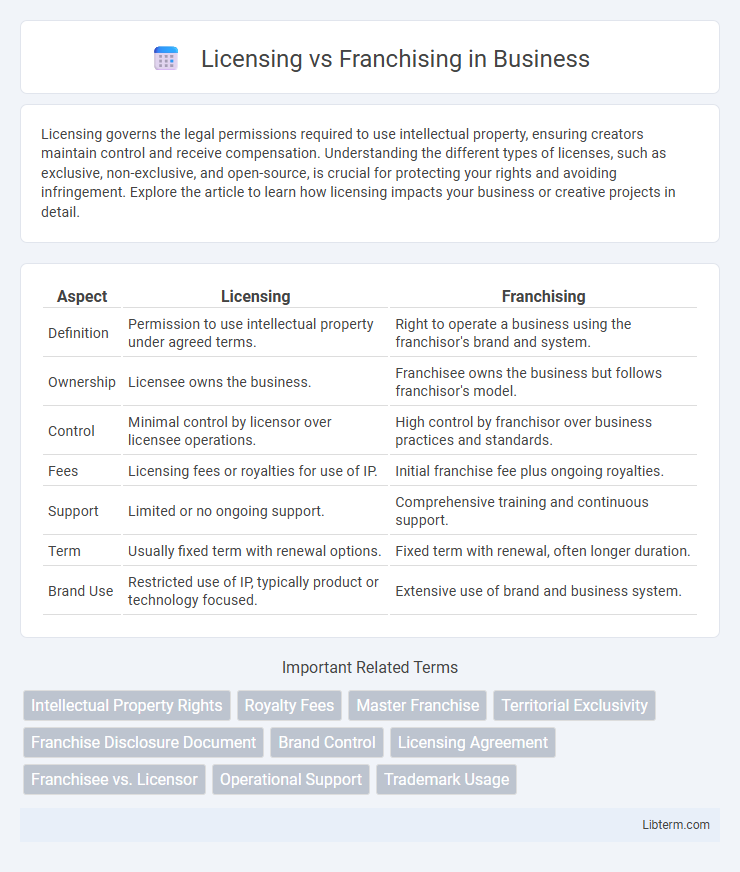Licensing governs the legal permissions required to use intellectual property, ensuring creators maintain control and receive compensation. Understanding the different types of licenses, such as exclusive, non-exclusive, and open-source, is crucial for protecting your rights and avoiding infringement. Explore the article to learn how licensing impacts your business or creative projects in detail.
Table of Comparison
| Aspect | Licensing | Franchising |
|---|---|---|
| Definition | Permission to use intellectual property under agreed terms. | Right to operate a business using the franchisor's brand and system. |
| Ownership | Licensee owns the business. | Franchisee owns the business but follows franchisor's model. |
| Control | Minimal control by licensor over licensee operations. | High control by franchisor over business practices and standards. |
| Fees | Licensing fees or royalties for use of IP. | Initial franchise fee plus ongoing royalties. |
| Support | Limited or no ongoing support. | Comprehensive training and continuous support. |
| Term | Usually fixed term with renewal options. | Fixed term with renewal, often longer duration. |
| Brand Use | Restricted use of IP, typically product or technology focused. | Extensive use of brand and business system. |
Introduction to Licensing and Franchising
Licensing grants a company the legal permission to use its intellectual property, such as trademarks, patents, or technology, to another party for a specified period, enabling revenue generation without direct management involvement. Franchising involves a franchisor providing a franchisee the comprehensive rights to operate a business under the franchisor's brand, using established systems, training, and ongoing support to maintain brand consistency. Both models facilitate business expansion internationally with reduced risk and capital investment compared to direct operations.
Defining Licensing: Key Concepts
Licensing involves a contractual agreement where a licensor grants a licensee the rights to use intellectual property, such as trademarks, patents, or technology, in exchange for royalties or fees. Key concepts include the scope of license, territory limitations, duration of the agreement, and specific rights granted, which can range from manufacturing to marketing. Licensing allows companies to expand market presence with lower risk and capital investment compared to other business models.
Understanding Franchising: Core Principles
Franchising involves a business model where a franchisor grants a franchisee the right to operate under its brand and system in exchange for fees and royalties. Core principles include leveraging an established brand, standardized operations, and ongoing support to ensure consistency and market presence. This structure enables rapid expansion while maintaining quality and customer trust across multiple locations.
Legal Frameworks: Licensing vs Franchising
Licensing agreements grant permission to use intellectual property within defined terms, governed primarily by contract and intellectual property law, with fewer regulatory requirements compared to franchising. Franchising operations are subject to comprehensive legal frameworks, including the Federal Trade Commission's Franchise Rule, which mandates detailed disclosures and compliance obligations to protect franchisees. Understanding these distinctions in legal frameworks is crucial for businesses evaluating risk, control, and regulatory compliance in their expansion strategies.
Control and Autonomy Differences
Licensing offers licensors less control over the licensee's daily operations and brand usage, allowing more autonomy in how products or services are marketed and managed. Franchising entails stricter control mechanisms, where franchisees must adhere closely to the franchisor's operational guidelines, brand standards, and business model to ensure consistency. This control difference impacts the autonomy, with franchisors exercising significant influence over franchisees, contrasting with licensors' more hands-off approach.
Financial Implications and Revenue Models
Licensing involves granting rights to use intellectual property in exchange for royalties or fees, generating revenue primarily through a percentage of sales or fixed payments, often resulting in lower upfront costs and risks compared to franchising. Franchising requires an initial franchise fee and ongoing royalties based on gross revenue, providing a structured revenue model that includes support services and brand control but entails higher financial commitment and operational oversight. Both models impact cash flow differently; licensing offers more passive income streams, while franchising demands continuous investment in brand consistency and franchisee success.
Brand Management and Intellectual Property Rights
Licensing allows a company to grant permission to use its intellectual property, such as trademarks or patents, while maintaining ownership and control over brand management decisions. Franchising involves a comprehensive brand system where the franchisor imposes strict operational standards to ensure consistent brand identity and customer experience, enhancing intellectual property protection. Effective brand management in franchising relies on rigorous control over brand usage, whereas licensing prioritizes contractual protection of intellectual property rights with less control over brand application.
Risk Factors and Potential Challenges
Licensing involves granting permission to use intellectual property with lower financial risk but limited control over the licensee's operations, increasing potential brand dilution. Franchising requires strict adherence to operational guidelines, presenting higher risk due to substantial initial investment and ongoing support obligations, but it allows greater control over brand consistency. Both models face challenges such as legal complexities, market adaptability, and dependence on partner performance, which can impact long-term profitability and reputation.
Suitability: Which Model for Your Business?
Licensing suits businesses looking to leverage intellectual property without extensive operational control, ideal for companies seeking passive income from patents, trademarks, or technology. Franchising fits businesses aiming for rapid expansion through standardized operations, benefiting from franchisee investment and consistent brand management. Assess your business goals, resource availability, and desired control level to determine whether licensing's flexibility or franchising's comprehensive system aligns best with your growth strategy.
Conclusion: Making an Informed Choice
Choosing between licensing and franchising depends on your business goals, control preferences, and capital investment capacity. Licensing offers a flexible, low-risk way to expand intellectual property with reduced oversight, while franchising demands greater control and support but potentially yields higher returns and brand consistency. Carefully assessing your brand strength, resource availability, and long-term growth ambitions ensures a strategic decision aligning with your market expansion objectives.
Licensing Infographic

 libterm.com
libterm.com